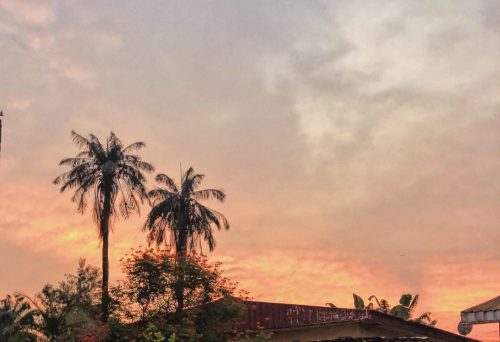I’m currently three weeks into my time in Cameroon, and yet it somehow feels like a lifetime. There is so much I could include in this post, but I it’s probably best to just explain what I’m doing here in the first place.
I first arrived in Cameroon’s capital city, Yaoundé, which is in the Western region of the country. Yaoundé is one of Cameroon’s two biggest cities (the other being Douala) and is bustling with activity. After a weekend there, where I stayed with a wonderful host family, I took the 6 hour bus ride to Bertoua. The trip was crowded and sweaty but filled with beautiful landscapes of Central Cameroon.
Bertoua is the capital of the East Region, which is also the least developed region in the country. I live with a host family, made up of my host mother and three host sisters: Ines (18), Plinta (12) and Lafortune (10). The girls are all grand-children of my host mother and have come from their home villages to have better lives in Bertoua. There is no running water or Internet in the house, but we do (occasionally) have electricity, a dog named Deek, two chickens, and two extremely loud roosters.
Bertoua is a “city”, in Cameroonian terms. There is the centre ville market area, where one can find everything from grocery stores to television sets to government offices. The streets, mostly mud, are a steady current of moto taxis, which do not stop when you try to cross.

Three days a week, I take a 10-minute taxi ride (in a car, which are much harder to come by) to the neighboring village of Mandjou. Mandjou is geographically large but less packed with people and activity. It is a village in every sense of the word, and has become home the last few years to thousands of refugees from CAR. Since 2012, a brutal civil war has ravaged the country, forcing many families to flee across the Western border and settle in the Eastern region of Cameroon.
In response, Mandjou has become an interesting mix of resettled CAR refugees and local Cameroonians. Regardless of their origin, nearly all live in desolate poverty, with entire families sharing one room and one bed, or multiple families shoved into houses designed for one.
My community parter, RESPECT Cameroon, a local NGO, has a school for refugees in Mandjou, called Project ANICUR. ANICUR is designed to relieve the achievement gap faced by resettled refugee students in Mandjou. Most students are years behind their peers, as their studies were halted due to the conflict and subsequent displacement from their origin country. Most do not yet speak French, but instead the local language Fulfulde (which many Cameroonians also speak). Cameroonian public schools are not designed to cater to this marginalized community, and these families cannot afford private schools. ANICUR is the only free, private school specialized for refugee education and reinsertion in Mandjou.
On my days in Mandjou, I spend the mornings with some of the students at the school, who are on summer vacation but continue to arrive most days for something to do. I (try) to teach them English songs, games, the alphabet, and review general math concepts. By the end of the morning, there is usually upwards of 30 students present, aging from a few months to 12 or 13 years old. They are hard to control, since most do not speak French. But I hope that my lessons are at least something to help them.
In the afternoons on these days, my guide, Lucien, who is also the General Secretary of the school, and I venture into Mandjou to find refugee women willing to talk to us. RESPECT is hoping to implement a project to “automatize” refugee women in Mandjou, focusing specifically on young and widowed women. The refugee population is largely Muslim of the Bororo. Within the Bororo community, there are very strict cultural and gender roles. Most men have multiple wives; women are expected to be wives and mothers and nothing else. These women often have little to no agency in their lives, and are subject to the decisions of their husbands, which can constitute severe emotional and physical abuse.
Lucien and I search for women who are home alone or unmarried (we discovered early on that a woman will not talk if her husband is present) and ask them general questions about their lives, histories, and problems. Some talk about the abuse they’ve experienced, others don’t. All were married before the age of 15 and have multiple children. Many thank me for coming and asking about their lives; I get the impression that no one has done that for them before.
The other two days of the week, I remain in Bertoua and work at a hotel that has WiFi, because very few places do. On these days, I research, write, and apply to various grants and funds on behalf of RESPECT and its various projects. I like these days after the hot and exhausting beginning of the week in Mandjou.
It is both difficult and fulfilling to be here. I feel passionate about my work, and am grateful for the experience to build relationships with the people here. At the same time, it is a very alienating and lonely life. I am a constant target of harassment and discomfort and find many cultural and language barriers extremely difficult to overcome. But I am living, and I am learning.
Learn more about my time in the East with my podcast “A White Girl’s Guide to the East” – coming soon, linked here.
